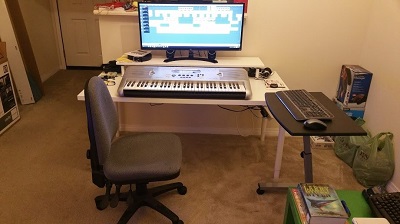Maybe you can help me puzzle out how my music studies can help me write novels.
For years now I've been haunted by scraps of music. They seem to come out of nowhere. Some are likely from popular songs and symphonies. Others seem to be my own. I created a shorthand for musical notation. Once written down and hummed, or sung with nonsense words like a dyslexic rapper, and then filed away, they quit haunting me.
Except the scraps keep getting longer and more complicated. So I did what many others have done. I put together a music composition workstation. It's made of a notebook computer I rarely used. Attached to it is a cheap electronic piano, a very wide screen monitor, a good sound system, and a mouse and keyboard. I found software that lets me play music, capture it in a MIDI file, and display it in standard music notation. You can see an image of it at the end of this post.
Here's where story writing comes in. Studying music I found that there are techniques for making a song or a symphony. Shorter works of three to five minutes long often have two to four parts, arranged say ABAB or ABC-AC-D. Symphonies can have even more parts. Each of them may be performed louder or softer, faster or slower. What are some typical parts we might split our stories into?
There are usually two layers of music, which I find harder to translate into story terms. A typical band has a bass or percussion instrument that lays down a "bottom" layer. Atop that is a lyric layer, a voice or an instrumental version of a voice. A piano can play both layers, the left hand the bass layer, the right hand the lyric layer. More complex songs or symphonies may have several layers, each played by a different instrument. How might we do something similar to layers in a story?
A simple advertising ditty I can understand at my present state of learning. More complex works are harder to understand. Have you ever tried to separate out the parts and layers of later Beatles music, where they did studio productions with up to a dozen instruments - including a sitar?!!! Even Britney Spears' early stuff baffles me right now.
Oh, well. Embarking on music studies and practice is like beginning a voyage around the world. I expect to die before I reach Katmandu. But what a journey I'll have.

For years now I've been haunted by scraps of music. They seem to come out of nowhere. Some are likely from popular songs and symphonies. Others seem to be my own. I created a shorthand for musical notation. Once written down and hummed, or sung with nonsense words like a dyslexic rapper, and then filed away, they quit haunting me.
Except the scraps keep getting longer and more complicated. So I did what many others have done. I put together a music composition workstation. It's made of a notebook computer I rarely used. Attached to it is a cheap electronic piano, a very wide screen monitor, a good sound system, and a mouse and keyboard. I found software that lets me play music, capture it in a MIDI file, and display it in standard music notation. You can see an image of it at the end of this post.
Here's where story writing comes in. Studying music I found that there are techniques for making a song or a symphony. Shorter works of three to five minutes long often have two to four parts, arranged say ABAB or ABC-AC-D. Symphonies can have even more parts. Each of them may be performed louder or softer, faster or slower. What are some typical parts we might split our stories into?
There are usually two layers of music, which I find harder to translate into story terms. A typical band has a bass or percussion instrument that lays down a "bottom" layer. Atop that is a lyric layer, a voice or an instrumental version of a voice. A piano can play both layers, the left hand the bass layer, the right hand the lyric layer. More complex songs or symphonies may have several layers, each played by a different instrument. How might we do something similar to layers in a story?
A simple advertising ditty I can understand at my present state of learning. More complex works are harder to understand. Have you ever tried to separate out the parts and layers of later Beatles music, where they did studio productions with up to a dozen instruments - including a sitar?!!! Even Britney Spears' early stuff baffles me right now.
Oh, well. Embarking on music studies and practice is like beginning a voyage around the world. I expect to die before I reach Katmandu. But what a journey I'll have.




 )
)